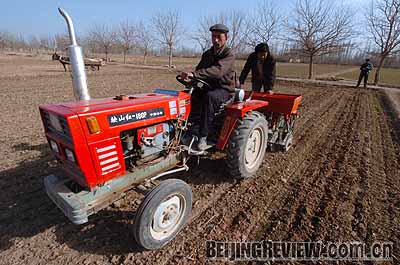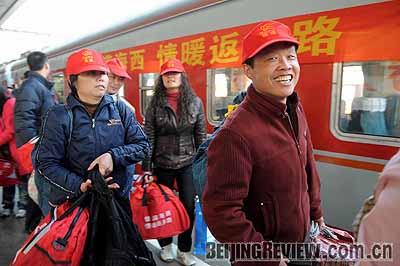| As in the past five years, the Central Committee of the Communist Party of China (CPC) and the State Council have dedicated their No. 1 document for 2009 to agriculture, the countryside and farmers.
 |
|
PLOWING ALONG: The No. 1 document this year stresses the continuation of the land contracting system and improving the transfer of land use rights (XINHUA) |
 |
|
Among the 130 million migrant workers, 20 million will return jobless from cities to the countryside this year. The picture shows a migrant worker taking a train home (JIANG KEHONG) | On February 1, the CPC Central Committee and the State Council jointly issued the No.1 document entitled "Opinions on Policies for Promoting Steady Agricultural Development and Facilitating Farmers' Incomes." Although this year will witness the hardest challenges since the beginning of the present century, the country will plow ahead with tough measures for developing agriculture and the countryside, it said. The document also said decreasing resource product prices on the global market, increasing public concerns about food security and fast-diminishing employment opportunities for rural migrant workers are among the most critical issues facing the countryside.
"The biggest potential for boosting domestic demand lies in rural areas; the foundation for securing steady and relatively fast economic growth is based upon agriculture; and the toughest work of securing and improving people's livelihoods remains with farmers," the document said.
More support for grain production
The global financial crisis has adversely affected China's economy, including its agriculture and rural sectors, since the second half of last year. Increases in farm produce prices have slowed down, and the prices of some farm produce and related products have come down.
At a press conference in Beijing on February 2, Chen Xiwen, Director of the Office of the Central Leading Group on Rural Work, said that the pressure of decreasing farm produce prices would be a big challenge for rural economic growth this year. He also said measures put forward by the government to deal with this problem included increasing input in agricultural infrastructure and science and technology services and reducing the operational costs of farmers; further increasing various direct subsidies to agriculture, including 120 billion yuan ($17.54 billion) for grain production, improvement of strains, farm machinery purchasing and capital goods; increasing the minimum level of the purchase price of grain; increasing the government's grain reserves; and reasonably regulating exports.
"As long as grain prices can be kept at a reasonable level, prices of most other farm produce can stay at a reasonable level," Chen said.
Promoting employment
A survey conducted by the Ministry of Agriculture in 150 rural villages in 15 provinces indicated that 15.3 percent of 130 million migrant workers, or about 20 million, had returned jobless from cities to the countryside, Chen said.
"Salary income has accounted for 40 percent of farmers' total income in recent years. Therefore, the reduction of employment of migrant workers will make it difficult to increase farmers' incomes," Chen said.
Hence the document urges central and local government departments to adopt measures to create jobs and increase farmers' incomes. Companies have been asked to take on more social responsibility by giving rural migrant workers favorable employment treatment. It also encourages flexible employment policies and more training opportunities. It also said local government departments should increase their investments to provide favorable taxation and fee policies for those who have lost jobs in cities and expect to find new jobs in their hometowns. The document also requires relevant government departments to formulate basic pension insurance measures suitable for rural conditions and migrant workers to ensure their rights.
Chinese farmers' net per-capita income reached 4,761 yuan ($696) in 2008, up 8 percent, or 621 yuan ($91), not including price factors. This was the largest increase in farmers' income in the country's history and the fifth consecutive year of a 6-percent-plus growth.
But Chen said farmers' incomes would be affected by the global economic crisis, which has reduced the demand for and prices of many commodities. Declining agricultural commodity prices and rising unemployment among migrant workers would constrain farmers' income growth in 2009. The government would offer more subsidies and provide more advanced technology and improved public services to help farmers, he said.
Farmland rights
The document reiterates that the government will continue with and improve the household contract responsibility system that entrusts the management and production of publicly owned farmlands to individual households through long-term contracts. It also underscores farmers' rights to transfer their farmland use rights to others, although the land would still be owned collectively and should only be used for farming.
| 